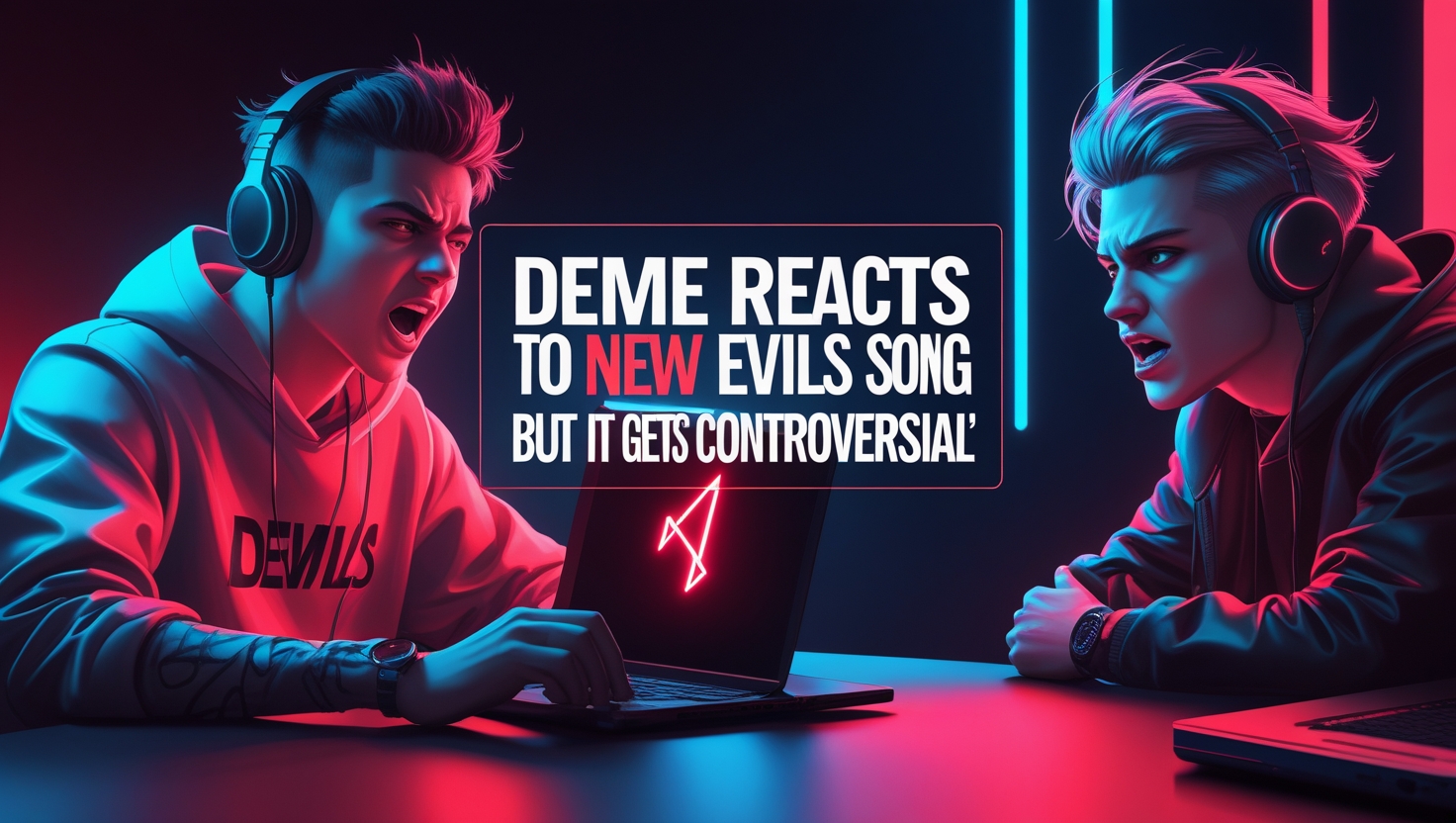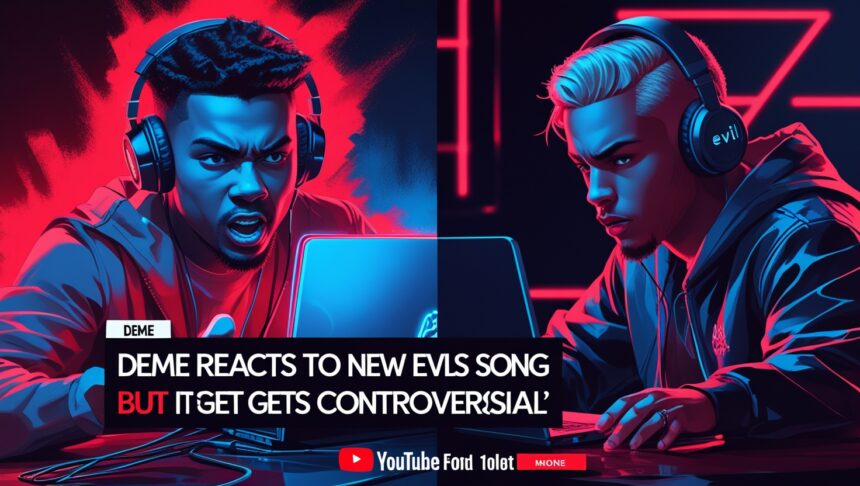When it comes to music reactions online, audiences expect honest feedback, entertaining commentary, and occasionally, bold opinions that spark heated debate. That’s exactly what happened when Deme reacted to the new Evils song, a release that already carried a mysterious buzz before fans even pressed play. His reaction quickly became a trending topic, drawing strong emotions from both loyal fans and casual viewers. For some, Deme’s words resonated with how they felt about the track; for others, they went too far, crossing into controversial territory.
In this article, we’ll take a deep dive into the story of Deme’s reaction to the New Evils song, why it’s become a point of contention, and how it reflects the broader dynamics between creators, music, and audiences in the digital age. Along the way, we’ll explore the background of both Deme and Evils, unpack what makes this reaction stand out, and offer insights into how online culture shapes these conversations.
Quick Information Table
| Detail | Information |
|---|---|
| Name | Deme (full name not publicly disclosed) |
| Profession | Content Creator, Music Reactor, Online Commentator |
| Known For | Honest, energetic reactions to hip-hop and alternative music |
| Audience Base | Primarily U.S. viewers, growing international following |
| Latest Highlight | Reaction to the New Evils Song, sparking online debate |
.
Who Is Deme? A Quick Look at His Background
Before unpacking the controversy, it’s important to understand who Deme is and why his opinion carries weight online. Deme built his reputation as a content creator and reaction personality who focuses on hip-hop, alternative, and underground music scenes. His style blends raw honesty with energetic delivery, which has attracted thousands of viewers who tune in specifically for his unfiltered takes.
Unlike reviewers who stick to scripted commentary, Deme thrives on spontaneity. His facial expressions, pauses, and off-the-cuff remarks make his content feel real and relatable. He’s not afraid to laugh when a lyric feels over the top or stop the music entirely to explain why a certain bar hits harder than expected. Over time, this approach has earned him credibility as someone who listens closely while also entertaining his audience.
Who Are Evils and Why Does Their Music Matter?

The other half of the story is Evils, a rising artist known for pushing boundaries in both sound and lyrical themes. Evils has developed a reputation for blending experimental production with unapologetic storytelling, often leaning into darker, provocative tones. Their fan base celebrates the willingness to say what others won’t, but critics argue that the music sometimes goes too far.
The new track in question was released with heavy anticipation, as Evils has become somewhat of a lightning rod in the underground scene. The artist’s songs regularly spark passionate discussions about meaning, artistry, and intent. In that context, it’s not surprising that a strong personality like Deme would generate a storm of responses with his review.
The Reaction Video That Started It All
When Deme uploaded his reaction to the New Evils song, the video seemed like another typical entry in his channel lineup. But within minutes, it was clear that this would be different. He began by complimenting the beat and acknowledging the unique production value, but as the lyrics unfolded, his tone shifted. He paused multiple times, questioning the message behind certain bars and even raising concerns about the influence of the track on younger listeners.
The energy in his delivery combined with pointed critiques made the reaction more than casual commentary — it became a statement. Clips of the video circulated quickly on social platforms, where viewers debated whether Deme was offering necessary honesty or unfair criticism of an artist who thrives on shock value.
Why the Reaction Sparked Controversy
So what made this particular reaction so controversial? A few factors stand out:
-
Directness of Criticism – Deme didn’t soften his words. He openly called certain lyrics “reckless,” which some fans interpreted as disrespect.
-
Generational Divide – Older listeners sided with Deme’s cautious tone, while younger fans argued that Evils’ style is simply part of modern music expression.
-
Cultural Context – The U.S. music scene is no stranger to polarizing lyrics, but conversations about responsibility and influence are ongoing. Deme’s comments struck at the heart of this debate.
-
Amplification Online – Once snippets hit TikTok, Twitter, and Reddit, the reaction wasn’t just about the song — it was about Deme versus Evils’ fan base.
Together, these elements turned what could have been just another reaction into a flashpoint for a wider cultural conversation.
Audience Responses: Divided and Vocal
The comment section of Deme’s video became a battleground. Supporters applauded him for being “the only one keeping it real” and praised his willingness to speak his mind. Others accused him of clout-chasing or misinterpreting Evils’ artistic intent. The debate extended far beyond the video, with fans making reaction-to-the-reaction content, creating memes, and launching long Reddit threads.
This illustrates how reaction culture has evolved into a two-way conversation, where both the creator and the audience shape the narrative. For Deme, this meant navigating an unexpected wave of attention, both positive and negative, that pushed his platform into the spotlight.
The Balance Between Honesty and Respect in Music Reactions

One reason this story resonates with so many is that it raises the timeless question: How honest should a reviewer be? For Deme, his brand relies on authenticity. His viewers trust him because he doesn’t hold back. At the same time, artists pour personal effort into their work, and harsh reviews can feel dismissive or disrespectful.
Navigating this balance is especially tricky with artists like Evils, who thrive on controversy themselves. If the goal of the music is to spark reactions, then Deme’s response could be seen as a natural continuation of the art. On the other hand, when words ignite fan wars, the fallout can extend beyond music appreciation into personal attacks and toxic debates.
The Role of Controversy in Digital Culture
It’s worth noting that controversy often fuels visibility online. Evils has built a brand around pushing limits, and Deme’s reaction amplified the reach of the new track. In some ways, both parties benefited: Evils gained more streams as curious listeners checked out the song, and Deme’s video drew higher views and engagement than usual.
This highlights a recurring trend in digital media: the line between criticism and promotion is thin. While fans might argue over who’s right or wrong, the larger effect is that both the artist and the reactor gain more attention.
How This Shapes the Future of Reaction Content
The Deme-Evils moment may seem like just another viral debate, but it actually points toward larger trends in content creation. Viewers increasingly expect reactors to offer substantive analysis rather than surface-level responses. They also want transparency, emotional honesty, and relatability.
At the same time, creators are learning that their words carry real impact. A few seconds of blunt commentary can spread across platforms and frame the entire conversation around a song. Future reactors may look at Deme’s experience as a case study in both opportunity and risk.
What Fans Can Learn from the Debate
For music fans, this situation is a reminder of the power of perspective. A single song can be interpreted in countless ways, and reactors like Deme highlight that subjectivity. Disagreement doesn’t mean one side is right and the other is wrong; it shows the complexity of art and its reception.
The debate also reflects cultural values in the U.S., where freedom of expression collides with conversations about responsibility and influence. Both Evils and Deme are exercising their voices — and the audience plays a crucial role in deciding how those voices resonate.
Conclusion: Beyond the Controversy
At its core, “Deme Reacts to New Evils Song but It Gets Controversial” is about more than a single video. It’s about the evolving relationship between creators, artists, and fans in the digital space. Deme’s honesty struck a nerve, Evils’ bold artistry provoked strong emotions, and the audience magnified it all into a cultural moment.
Whether you agree with Deme’s take or side with Evils’ vision, one thing is clear: reactions are no longer just entertainment — they’re part of the artistic conversation itself. As music continues to push boundaries and creators like Deme respond, these moments of tension will keep shaping the landscape of online culture.
FAQs
1. Who is Deme, and why are his reactions popular?
Deme is a content creator known for his energetic and unfiltered music reactions. Fans appreciate his honesty and spontaneous commentary, which makes his videos feel authentic.
2. What makes the New Evils song so controversial?
The track includes provocative lyrics and experimental sounds that sparked debate. Some fans see it as bold artistry, while others consider it reckless or harmful.
3. Why did Deme’s reaction gain so much attention?
His blunt critique of the lyrics struck a chord with audiences. The reaction video quickly spread across social platforms, leading to widespread debate.
4. Did Deme’s reaction hurt Evils’ reputation?
Not necessarily. While some fans were upset, the controversy boosted visibility for Evils. In fact, the song received more streams as people tuned in to form their own opinions.
5. What does this mean for future reaction creators?
It shows that honesty can build credibility, but words also carry weight. Creators must balance authentic opinions with awareness of how their commentary shapes discussions.












